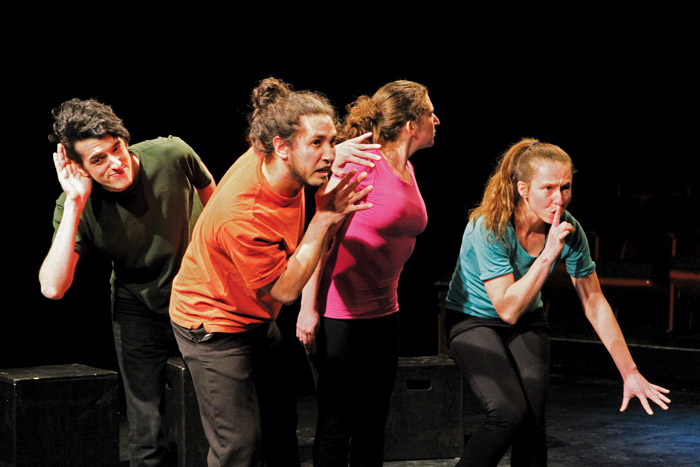Those who have spent any considerable amount of time in Montreal are aware that the issue of multilingualism is more than simply one of communication. It’s a complex narrative of social history, political debate, and the search for individual identity—all inexorably linked to the myriad of personal histories that inform the beliefs of every Montrealer. In their most recent production held at the Mainline Theatre, Promito Playback presented Traverser la Main, a presentation that explores stories of multilingualism in everyday Montreal life with all of the nuance, personality, and eccentricity of the city itself.
Playback theatre, which is improvised theatrical performance based upon stories casually shared by audience members, is a deeply personal medium that places the direction and tone of the production entirely in the hands of the viewer. It allows the stories told by the cast to be a direct reflection of the experiences and beliefs of those attending the performance. Promito Playback has had extensive experience using playback theatre as a medium to explore the perspectives from everyday life on controversial issues, performing shows discussing topics such as racism and sexual identity. The careful nature and comfort of Promito Playback in presenting varied opinions and beliefs allowed Traverser la Main to be an accepting yet probing environment in which each audience member’s preconceived notions of the issue at hand were simultaneously respected and challenged.
The production itself was deceptively simple for the weight of the topic, with no complex adornments on the black box stage or any unified costumes. The stage was decorated with nothing more than four black stools, and the only props utilized were simple sheets of coloured fabric. To generate ambience, each scene was subtly punctuated by the sounds of various obscure traditional instruments played quietly at stage right. The rawness of the production allowed all attention to be drawn to the stories themselves, with little to no distraction by superfluous theatricality. Each interpretation was performed with less of a focus on direct representation of the story, and greater emphasis on the emotions associated with it. The dramatic and at times intense portrayals of emotion in each scene often bore more of the distinct feel of conceptual performance art than of traditional playback theatre.
Each story was told and subsequently performed in the native or preferred tongue of the storyteller, leading to a completely comfortable and fluidly bilingual show. The use of multiple languages in the presentation did not only allow each story to be told in the most comfortable way for the storyteller, but also clearly and deliberately mirrored the very themes the show itself presented.
While the acting and production were artful and engaging, the true value and meaning of the evening came from the diverse, probing, and sometimes shocking stories provided by the audience. Some were simple and uplifting tales of acquiring a new language, while others were heavy with decades of pain and struggle. Stories of growing up as a francophone in the shadow of Bill 63 were dramatically contrasted with stories of anglophone immigrants struggling to learn and work in French in modern Montreal. All stories were welcomed with equal enthusiasm, and the theatrical interpretations were of profound depth. Throughout the evening, the portrayals of each story combined to form a complex and multifaceted image of what it truly is to be a member of the community as a whole—whether as an anglophone or francophone.
Perhaps most engaging of all was the continued open discussion on the topic encouraged by the cast and crew after the show. As with their other performances, the Promito Playback team invited the audience to continue conversation in the comfortable living-room-style lobby of the Mainline Theatre after the conclusion of the performance. There, audience members congregated, indulged in refreshments, and delved deeper into the topics of the evening. By generating this type of impassioned discussion, Traverser la Main powerfully realized the artistic vision of its cast—showcasing the true complexity, humanity, and individuality so inseparably linked with language identity in Montreal.







